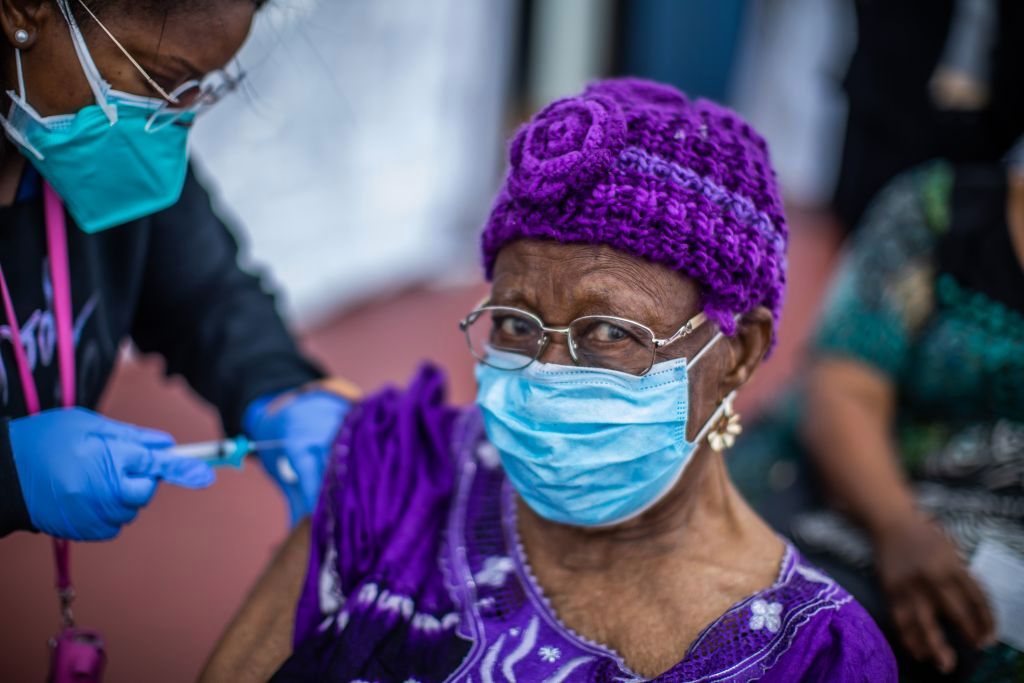
Throughout the COVID-19 pandemic, Advancement Project California’s RACE COUNTS initiative has provided Californians with novel and timely analyses and policy solutions that account for the interests of hardest-hit communities across the state: low-income and communities of color. This work is only possible because of strong community partnerships. Here we will share the impact of our work in Los Angeles County over the course of the past year.
THE PROBLEM
The COVID-19 pandemic has shown that one of the deadliest underlying conditions in America is systemic racism. Released in May 2020, our interactive report How Race, Class, and Place Fuel a Pandemic was one of the first to bring attention to COVID-19’s disproportionate impact on Black, Latinx, Native American, and Pacific Islander communities in Los Angeles County. Angelenos in hardest-hit communities faced multiple challenges as more affluent communities were able to shelter in place safely.
Our report highlighted how
- Numerous barriers to COVID-19 testing, including distance to testing sites, lack of access to the internet to make appointments, and police presence at testing locations in communities with a history of over-surveillance.
- Many Angelenos have struggled to meet their basic needs, including buying groceries and making rent or mortgage payments.
- Overcrowded housing conditions, dependence on public transit, lack of neighborhood access to grocery stores, and disproportionate employment in essential services. fueled the virus’s spread in communities of color.
- Public education campaigns around COVID-19 were not reaching residents in hardest-hit communities.
- Residents’ fear of the government kept them from accessing testing, medical services, and other supports.
- Hardest-hit communities were not receiving adequate resources to meet basic needs and protect residents from infection.
THE SOLUTION
Advancement Project California brought community-based organizations with deep roots in impacted communities to review our data findings. Together, we crafted recommendations to ensure the health and safety of everyone, regardless of race and income.
Recommendations included:
- Providing personal protective equipment, increasing essential worker protections, and targeting testing and other resources to hard-hit communities.
- Focusing on systemic solutions over–targeting individual behavior.
- Increasing access to COVID-19 testing.
- Creating culturally relevant communications campaigns.
- Enlisting the support of trusted community messengers to interrupt the spread of misinformation.
- Using culturally sensitive practices in the staging of COVID-19 testing sites.
OUR IMPACT
LA County Supervisors Hilda Solis and Sheila Kuehl authored a motion incorporating many of the report’s recommendations. After the motion passed, County Board Supervisors asked Advancement Project California to bring together representatives from various sectors to operationalize the recommendations. This cross-sector workgroup prioritized increased testing in the communities disparately impacted. To help the workgroup further its goals, we conducted a Hot Spot Analysis to help the group identify the hardest-hit communities. Then LA County developed its analysis based on ours and used it to determine future testing sites. They emphasized leveraging trusted messengers to educate hard-to-reach communities about the spread of the virus and dispel myths related to testing. The cross-sector workgroup also created a community-based rapid response model for LA County to deploy in the hardest-hit communities.
The cross-sector workgroup wrapped up and summarized their work into a community-based rapid response memo that emphasized investing in community-based organizations as an indispensable element of LA County’s emergency preparedness and response. LA County established a multi-million-dollar COVID-19 Equity Fund to reach residents of hardest-hit communities, with grant amounts ranging from $100-$500 thousand.
NEXT STEPS
With infection rates trending downward and the economy reopening, we need to remain vigilant and continue to advocate for our most vulnerable communities. Equitable vaccine access is critical, and dismantling barriers to access requires urgent action. Our next pivot is to frame what a just and equitable post-pandemic recovery looks like in our hardest-hit communities. Our public leaders must prioritize investments in these communities to ensure that they not only survive but thrive in the future.